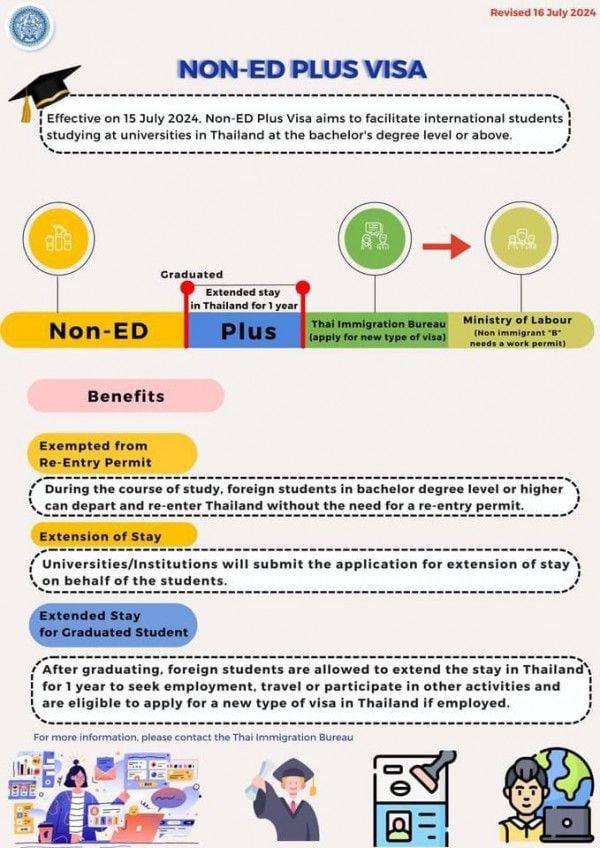Can you stay and work in Thailand with your new Thai degree after graduation?
What international students can expect when transitioning from study to work in Thailand

Graduating from a Thai university is a monumental moment of achievement, but for many who do graduate, the question quickly becomes: what’s next?
If you’re an expat graduate hoping to stay in Thailand and launch your career here, recent updates to Thai immigration policy may work in your favour. However, staying on legally and working requires understanding how visas, permits, and the local job market function. Here’s what you need to know.
Staying after graduation: The Non-ED Plus visa
Until recently, foreign students were expected to leave the country shortly after their education ended, as their student (Non-ED) visas would expire. But as of July 15, 2024, a new option has emerged: the Non-ED Plus visa.

This one-year visa extension allows you to remain in Thailand legally for up to 12 months after completing a bachelor’s degree or higher from a Thai institution. It’s an important bridge between graduation and employment, providing time to:
- Apply for jobs
- Explore further education
- Consider your next steps without needing to exit the country
Your university can file the extension on your behalf, and it includes multiple re-entry privileges, which means you can travel in and out of Thailand without additional permits.
But it’s worth repeating: this visa does not permit you to work. It simply gives you time to find a job and transition into a work visa later.
From graduate to employee: Visa conversion and work permits
Once you’ve landed a job, you’ll need to switch to a Non-Immigrant B (Business) visa, which allows legal employment, and then obtain a work permit.

The process usually looks like this:
- You receive a job offer.
- Your employer sponsors your visa and submits the required documents.
- You apply to change your visa status, without leaving Thailand, from Non-ED Plus to Non-B.
- Once approved, your employer helps you secure a work permit through the Ministry of Labour.
This combination of a visa and a permit is mandatory before you start working. Even roles like English teaching or part-time internships require legal approval. Your employer should be a registered company and meet specific criteria, such as hiring a certain number of Thai nationals per foreign worker or maintaining a minimum capital investment.
Restrictions on employment: What jobs are off-limits?
Thai labour law protects certain jobs for Thai citizens. As a foreign graduate, you cannot work in roles such as:
- Retail cashier
- Tour guide
- Construction labourer
- Hairdresser or masseuse
- Street vendor
However, there’s a wide range of industries open to you. Many international graduates in Thailand find employment in areas such as:
- Teaching: Especially in English-medium schools and universities.
- Corporate roles: Multinationals in Bangkok often seek employees with English fluency and global insight.
- Hospitality: Management and specialist roles in hotels and resorts (though not front-line tourism).
- NGOs and international organisations: Often based in Bangkok, these roles are suited to those with advanced degrees.
- Tech and startups: Growing sectors that value foreign skills, particularly in BOI-promoted industries.
Salary expectations and job market realities

Thailand’s starting salaries may be lower than what many foreign graduates are used to. Entry-level jobs often pay between 15,000 and 30,000 baht per month (about US$463 to US$926), which may just cover basic expenses in Bangkok.
On some occasions, depending on your industry, you could get paid up to 40,000 baht per month (about US$1,234), which can be found in tech-related fields.
This reality can be a shock for many, especially if you’re comparing earnings to home countries. It’s common for fresh grads to:
- Start with modest pay
- Build experience through internships or entry-level roles
- Slowly move into better-paying positions
Your language skills, international perspective, and academic background are assets, especially in jobs requiring global communication or cross-cultural understanding.
How to boost your chances of landing a job
Getting hired in Thailand as a fresh graduate can take time, but these strategies will help:
- Start early: Don’t wait until graduation — begin job-hunting in your final semester.
- Make internships count: Use them to gain experience and build networks. Some interns are hired full-time.
- Network: Join expat events, alumni groups, and business chambers. Many jobs in Thailand are filled through personal connections.
- Use online platforms: Update your LinkedIn profile and browse Thai job sites like JobsDB, JobThai, and Glassdoor.
- Learn some Thai: Even basic language skills can make a strong impression on potential employers.
- Stay flexible: Be open to roles that aren’t a perfect match for your degree at first. Gaining local experience matters.
Thinking beyond Thailand: Regional and remote options

If you’re open to opportunities outside Thailand, your degree from a Thai university could possibly serve you well in the ASEAN region and beyond. Many international graduates go on to work in:
- Singapore
- Malaysia
- Vietnam
- Their home countries
However, it is important to note that a Thai university degree will not serve you much outside of Thailand. Think about why so many Thai families make a huge effort to push their children to study in the US, UK, or Australian universities.
If a job in Thailand doesn’t pan out, you could also consider:
- Further study abroad: A Thai degree can be a springboard to postgraduate programmes in Europe, Australia, or North America.
- Remote work: The Destination Thailand Visa (DTV), launched in 2024, allows digital nomads to stay in Thailand while working for overseas companies, provided they meet financial requirements.
Yes, you can stay and work in Thailand after graduation but doing so requires careful planning. Thanks to the Non-ED Plus visa, you now have more time to explore your next steps, job hunt, or transition into a work permit without needing to leave the country immediately.

One thing to keep in mind is that the current job market in Thailand leans towards tourism, hospitality, and tech so these fields are the most lucrative for expats who are looking to work in Thailand. Even then, the job market at the moment is very competitive and challenging to enter, even for Thais, so you might have to grit through the initial process.
Still, expectations matter. Salaries may be modest, the job hunt may be slow, and paperwork is unavoidable. However, for graduates who prepare well, utilise the right resources, and remain flexible, a Thai degree can open the door to a unique and rewarding career in Thailand or beyond.
Whether you decide to settle in Bangkok, move elsewhere in Asia, or take your skills back home, the journey after graduation is yours to shape
The Thaiger key summary
- The Non-ED Plus visa gives graduates up to a year to stay legally while job-hunting or planning next steps.
- Legal employment requires switching to a Non-B visa and securing a work permit through a qualified employer.
- Salaries are modest and competition is strong, but flexible graduates can build careers in teaching, tech, hospitality, and multinational sectors
Latest Thailand News
Follow The Thaiger on Google News:


























